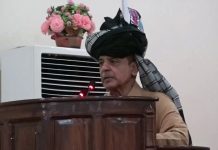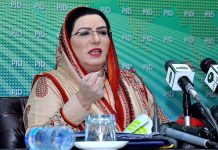ISLAMABAD: The federal cabinet on Wednesday approved revision of basic pay of some public officeholders and members of parliament (MPs) after 13 years.
The basic pay of Senate chairman and National Assembly speaker has been increased from Rs 119,008 plus two ad hoc relieves of Rs 31,750 and Rs 11,901 to Rs 205,000. Similarly, the basic pay of Senate deputy chairman and NA deputy speaker has been revised from Rs 110,085 plus two ad hoc relieves of Rs 29,360 and Rs 11,009 to Rs 185,000.
The basic pay of MPs has been increased from Rs 44,630 plus two ad hoc relieves of Rs 11,903 and Rs 4,463 to Rs 150,000.
Likewise, the basic pay of federal ministers has been revised from Rs 114,897 plus one ad hoc relief of Rs 11,490 to Rs 200,000.
Similarly, the basic pay of ministers of state has been increased from Rs 106,281 plus one ad hoc relief of Rs 10,626 to Rs 180,000.
Briefing the media after the cabinet meeting, chaired by Prime Minister Nawaz Sharif, Minister of State for Information, Broadcasting and National Heritage Marriyum Aurangzeb said the revision of basic pays of MPs and public officeholders had been pending for over a decade. The revised salaries, she said, were inclusive of the ad hoc relieves of 2010 and 2016.
She said it was very difficult to meet home expenses with a monthly salary of only Rs 44,000. The Federal Board of Revenue (FBR) and the Election Commission of Pakistan (ECP) figures depicted that most of the lawmakers belonged to the middle class. The total impact of pay revision would be Rs 400 million per annum, and the raise would be with effect from October 1, 2016, she added.
Marriyum Aurangzeb said the cabinet also approved amendments to the Public Procurement Regulatory Authority (PPRA) rules to make them more transparent.
The premier also constituted a committee – headed by Railways Minister Khawaja Saad Rafique, with Khawaja Asif, Zahid Hamid, Abdul Qadir Baloch and the finance secretary as its members – to review the Public Procurement Regulatory Authority (PPRA) rules. The committee would present its report within a month, she added.
The minister said the cabinet also approved empowering the Health Ministry to import vaccine for immunisation and anti-TB medicines in emergency situations.
Moreover, she said the cabinet gave approval to nine agreements signed with six countries – Azerbaijan, South Africa, Kazakhstan, Belarus, Maldives and Malaysia.
The agreements were on issues of disaster management, cooperation in defence sector, cooperation in information technology, combating corruption and exchange and training of medical practitioners.
She said the decisions of the Economic Coordination Committee (ECC) of the cabinet were also approved.
The minister said the cabinet also discussed the issue of Afghan refugees’ repatriation and it was decided that they would have to leave Pakistan by December 2017.
To a question, she said the cabinet strongly condemned the Indian aggression along the Line of Control and the Working Boundary, and offered Fateha for those martyred by Indian shelling.
She said the government was taking up the matter of Indian aggression at all levels, and as the information minister, she also condemned the Indian attacks in the strongest possible terms.














